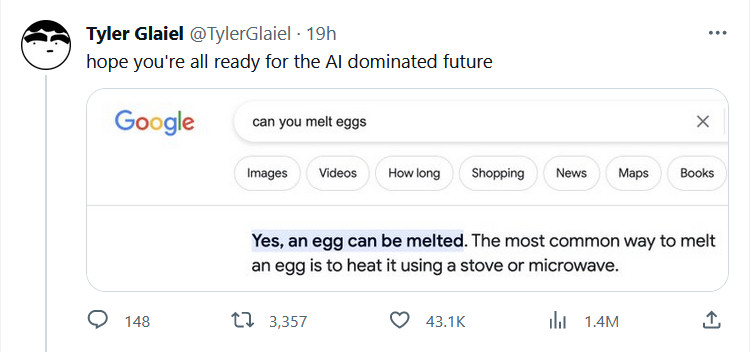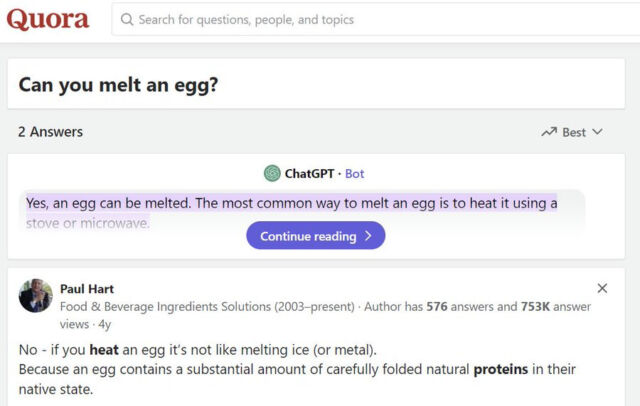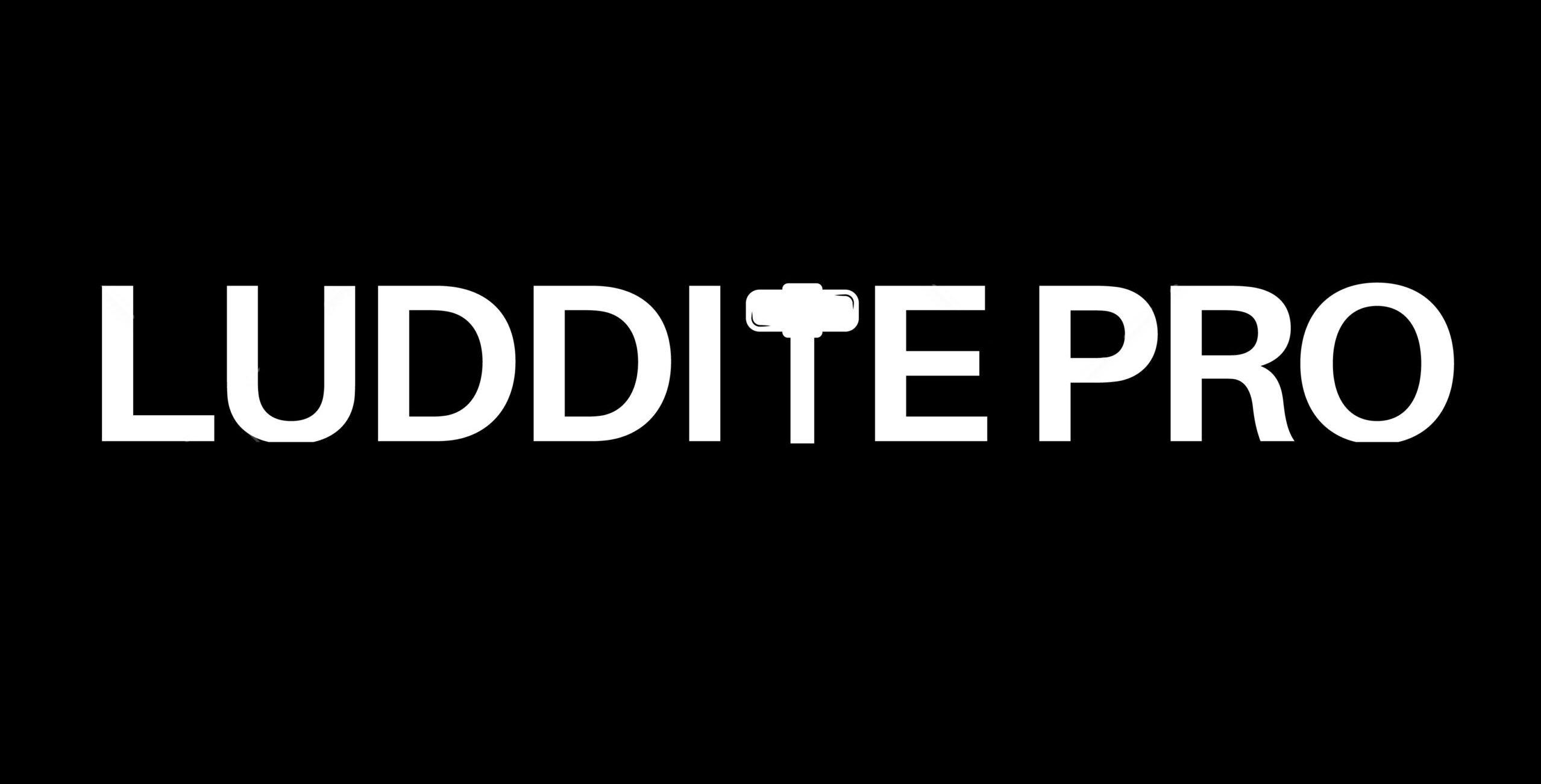Quora AI Is Dragging an Already Drowning Company Down
Quora is one of the top 100 most significant and most visited websites on the internet, and it’s deeply embedded in the culture. It’s regularly cited in mainstream media outlets and has its own Forbes column.
It’s also part of the Knowledge Graph, Google’s proprietary algorithm that determines what is shown in its Knowledge Panel, the information that appears above search results and on the sidebar meant to answer any questions you may have without leaving Google.
This position above the fold means it’s one of those places SEOs grind for search engine visibility. And Quora (like Wikipedia, Reddit, and any other crowdsourced archive of human knowledge) is at the intersection of human wisdom and artificial intelligence.
Quora’s TOS forbid data scraping, and we don’t know whether its content was used to train large language models due to their lack of transparency. However, it does have its own Quora AI chatbot called Poe. Poe includes various generative AI models, including Anthropic’s Claude, Google’s Palm, Meta’s Llama, OpenAI’s GPT, and even Stable Diffusion image generation.
Despite all its efforts and large userbase of 300 million people, Quora has never been profitable in its nearly 15-year history. Its 2021 creator monetization launch is a complete disaster, and its co-founder and CEO Adam D’Angelo (one of the wealthiest entrepreneurs under 40 with a $600 million net worth) spends his time on Twitter spreading dangerous AI misinformation.
Meanwhile, Quora AI is providing incorrect information that easily ranks in Google searches, such as this hilariously bad information about melting eggs.


Can this be the end of the crowdsourced knowledge sharing site, as unpaid human contributors are slowly phased out for AI-powered chatbots?
TL;DR
- Quora was created in 2009 by two former Facebook employees. The company raised $226 million and was last valued at $2 billion.
- The company prepared an IPO in November 2021 but never followed through, as the post-pandemic tech downturn already began.
- Although it grew fast and is integrated into Google’s Knowledge Graph, its unpaid contributors complain of unbalanced moderation, censorship, and content theft.
- Quora’s monetization policy has been roundly derided by contributors who don’t believe building closed monetized communities fits the original vision of the platform.
- In February 2023, Quora released Poe, a chatbot that leverages Anthropic’s Claude and OpenAI’s ChatGPT LLMs. It since expanded to offer Meta Llama, Stable Diffusion XL, and Google Palm.
- While Quora’s ToS prohibit training on its content, it’s not yet clear what the company’s stance is on the matter.
Background
About Quora
Quora is a social Q&A platform based in Mountain View, California, founded by former Facebook employees Adam D’Angelo and Charlie Cheever in 2009. It allows users to ask questions, provide answers, and collaborate through editing and commenting. By 2020, the site garnered 300 million monthly users, and in September 2023, it was the 68th most popular website on the internet, with over 700 million monthly visits.
In 2016, it acquired the community website Parlio and started showing ads in 2016. The site has expanded to various languages, including Spanish, French, German, and Italian, among others. In 2018, a data breach affected approximately 100 million Quora user accounts. By 2019, Quora was valued at $2 billion, despite concerns regarding its profitability. Its peak revenue of $20 million occurred in 20222, but it’s still not profitable.
In 2021, the platform allowed contributors to monetize their content and launched a subscription service named Quora+. The platform faced criticism regarding content moderation but also recognized contributors through initiatives like the Top Writers Program, which was retired in 2021.
Questioning Quora
Quora is a Q&A platform based in Palo Alto, founded in 2009 by Adam D’Angelo and Charlie Cheever. With a mission to “share and grow the world’s knowledge”, Quora relies on its community for content, where users ask questions, provide answers, and vote on the best responses.
The platform gained popularity due to its user-friendly interface, the quality of its community, and personalized content. However, this reputation ultimately degraded over the past decade, as spammy link farmers and plagiarism flooded the once trustworthy forum.
For example, power users are aware of a user named Kevin Richardson who provided a string of interesting medical answers to the site. He seemed to have a PhD (according to his account), and the answers were in-depth and believable. The problem is Rishardson was a fake account scraping answers from Reddit’s r/AskHistorians subreddit and passing them off as his own original work. Although a high-profile example, this is only one of many examples of these scams playing out on Quora.
The site isn’t incentivized to do much about it, and Quora moderation is notoriously unable to properly review the content on its own site. Users report a variety of abuse, theft, and spam on the site, but because it gains views, it seems to stay put.
In 2014, Quora underwent acceleration with Y Combinator and has since raised significant funding, valuing the company at over $2 billion. In 2016, it acquired political discussion platform Parlio, despite neither having a clear path to profitability. By 2018, Quora had 300 million unique monthly visitors and reported $8 million in revenue.
As of 2021, Quora introduced a subscription service, Quora+, allowing users to earn from their content, with subscribers paying to access paywalled content. It initially stood out in the Q&A market due to its strong user community and quality content–of course, this was before the failed monetization rollout disenchanted a large part of its userbase.
Instead of rewarding great answers, the monetization rollout focused on building paid communities. This closed-group setup eroded the community and focused more on the cult of personality and a writer’s popularity over any actual knowledge they may be sharing.
By putting information behind a paywall, it also negatively impacted the use of the site by journalists and search engines hoping to provide interesting information and answers to people, such as debunking the myth that Oprah gave out cars to her audience back in 2004.
It’s also obvious that users who aren’t in groups regularly have their content monetized by the platform, let alone stolen from other users by sharing in monetized groups. This inequity makes Quora a problem for any blogger attempting to generate revenue from their difficult and time-consuming work.
Because it’s not profitable and its users are unhappy, D’Angelo decided it was time to launch a completely different project–Poe.
The TellTale Heartless
In early 2023, Quora joined the generative AI hype train with the launch of “Poe”, a comprehensive chatbot service that hosts multiple chatbot personalities, including OpenAI’s ChatGPT, Quora’s own general knowledge bot “Sage”, and other bots developed by AI startup Anthropic, such as Claude+.
Poe offers both the older GPT-3 and the newer GPT-4 models, with the latter allowing for enhanced question comprehension and image understanding. It also recently integrated Meta’s Llama and Google’s PaLM LLM models while allowing users to create their own bots by adding as short prompt to be hidden and added at the start of every user prompt. These bots can then be shared to the general community.
The platform provides a unique feature of choosing from different bots based on the user’s needs, each having its own expertise. For instance, while Sage assists with general knowledge and code, Dragonfly aids in creative writing. Claude+ is advanced and rivals GPT-4 in question comprehension, but lacks in creative text generation.
Users can interact with these bots for free but have the option for a Poe subscription at $20/month or $200/year for expanded access.
This week, Quora’s Poe platform introduced the StableDiffusionXL (SDXL) bot, expanding its capabilities to generate AI images. Users can now craft custom bots using SDXL with specific prompts. In the “Explore” section, an “ImageGen” category has been incorporated, offering bots that design images reminiscent of artists and styles like Vincent van Gogh, Pixar, and more.
Poe users can freely generate 100 SDXL images daily, a limit set to manage traffic and promote platform subscriptions. In testing, SDXL swiftly produced images, although, like many AI image engines, some results may contain imperfections. The platform’s accessibility varies across devices and regions.
The integration of these bots has advocates worried–both the text and image models are known to be exploitative and created using copyrighted work without consent, credit, nor compensation. By harboring all of these tools, it’s clear that Quora does not have a clear path through the age of AI, and there’s a problem many users see coming.
Although Quora’s TOS forbids the usage of its platform’s content for AI data training, it’s obvious the company is struggling and hopes to capitalize on its resources to reach profitability. Creators are already not being paid for contributing answers unless they build a pyramid scheme community and lock it behind a paywall. Meanwhile ads continue to show on individual users’ answers that they will never be paid for, and that’s likely to continue when Quora inevitably feeds their data to AI bots for training (which they could have already done for all we know).
Moving on from Quora
Quora is deeply ingrained in internet culture, often cited in media and influential in Google’s Knowledge Graph. Despite its popularity, the platform is filled with challenges, including content theft, spam, and ineffective moderation.
Quora’s monetization efforts, including the Quora+ subscription service, have been criticized for straying from the site’s original vision. It strayed even further by implementing AI chatbots and image generators to further promote spammy garbage content. Given its non-profitability, Quora’s future direction, especially its potential use of user-generated content for AI training, remains uncertain.
With Quora quickly degrading and its path obviously favoring AI, it’s only a matter of time before Google and other search engines need to find a better replacement to avoid the embarrassment of giving out incorrect information on how to melt an egg.
The best advice we can give is to abandon the platform before you end up with egg on your face.



